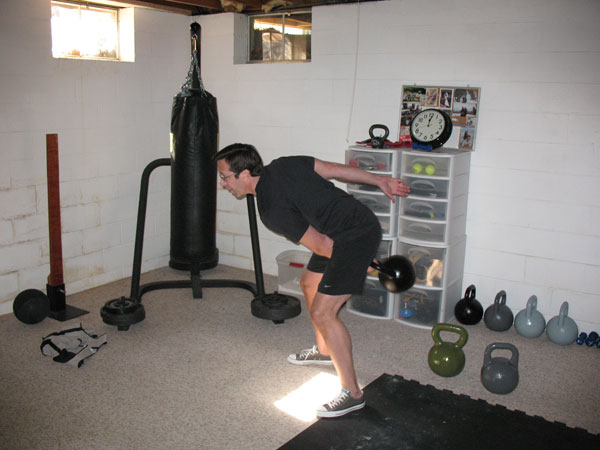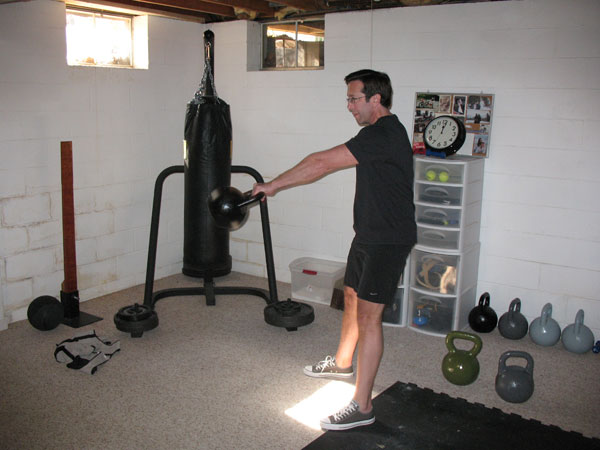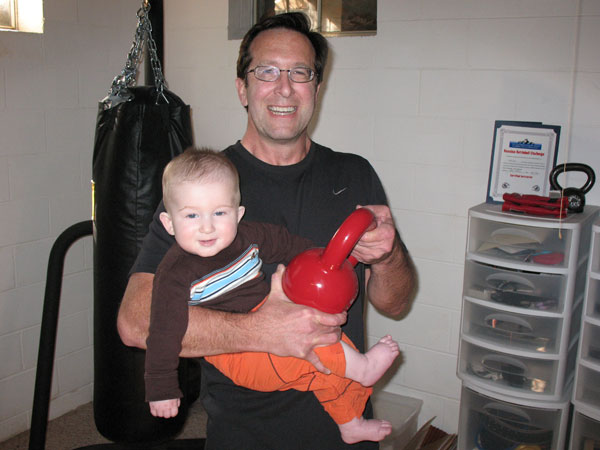Desk Jockey Daddy Periodization
Tactical Training for the Suburbs
Bill Fox
June 20, 2008 04:06 PM




I basically go on two kinds of tactical maneuvers these days. One involves a suit and tie, a laptop and a plane ticket, the other involves a diaper bag, a baby seat, a wife and of course, a baby. This article is for the all the "operators" out there whose missions more closely resemble mine then taking the beach without leaving a trace.
One of my favorite Pavel articles is his "Tactical Periodization" article. This article explained how best to keep a unit that could be called into action anytime in top condition, while assuring that they were never too cooked to be perform in what might be life and death situations.
So how does Pavel's article relate other 99.9% of us? Actually it applies pretty much across the board. Scheduling at the mercy of others, training possibilities limited by time and location, and the necessity of having the energy to do what needs to be done, whether at work or at home, when it needs to be done, not when you're nice and recovered and ready to do it — sound familiar?
The Desk Jockey part of Desk Jockey Daddy Periodization (DJD) means a lifestyle with an almost complete lack of incidental physical activity. Call it the soccer mom lifestyle, if you like; driving your kids to soccer isn't the same as playing soccer. If you have lots of incidental physical activity, like a construction worker, you still need to plan your workouts around it, but that's a different article. Add to that fluidity of schedule. One day is a meeting in another city then a working dinner. Tomorrow is the school play. Saturday is baseball and karate, unfortunately, you're not playing. If you live in the burbs, you drive to Starbuck's and probably the gym too. This might influence the decision as to what to do to reverse the onslaught of chair butt. Oh yeah, and there's the whole not sleeping thing if the kids are young enough, or old enough to drive.
In "Tactical Periodization" Pavel wrote, "Focus on short rather than long term planning and respect the laws of adaptation and you are in the tactical periodization business." You're also in the DJD periodization business. Ask yourself a question — what's the longest period of time for which I can pretty accurately know my schedule. For me it's generally a week, two at best. Of course this might change, but you can't worry about that. Forget 3 month macro cycles, year long linear periodization plans. Think, this is my plan from now until the next time I know I can't workout.
"You should find it interesting that Russian lifters do not use the big word 'periodization' in their dungeons; they say '
wavyness of load' and refer to planned variation of intensity and volume…..Therefore tactical periodization is short term PT planning that emphasizes variation of intensity and volume." Pavel's is discussing how using variation is the key to being able to "plan" when "planning" is a luxury. This emphasis on "
sharp and near random variation of intensity and volume" is part and parcel to the lifestyle of the Desk Jockey Daddy. Embracing this variation and planning for it, instead of constantly fighting it, which leads most to simply giving up, is the key to this plan.
Macro Cycle PlanningWait, didn't we just say no long term plans, cycles etc…Yup. This "macro cycle" may be a week, ten days, two weeks, whatever. It's the longest period of time for which you can see pretty clearly see what your schedule will be. What days can you train, what days can't you train. Yeah, yeah, I know, "you can always train"…do some burpees, pushups, pack the bell. You're a hardcore prison workout type of guy, or girl. There are really two issues there. One is simply, "not so much". It's easy to say you can always train, but when you're on a three day trip with your boss, meeting in the lobby at 6:45a.m. and getting back to your room at 9:00 p.m., can you really train? This ties directly into the second issue, if you fancy yourself so hardcore that your answer to the above is still "yes", then you need to ask yourself if you
should train. The whole idea here is finding a better way, not proving how tough you are at your own expense, and often the expense of training progress. How about proving how smart you are for a change?
What goes into this piece for me,( although the whole point of DJD periodization is adaptability, so your list may be very different), is the following:
Travel — this is my number one, in terms of absolute days off.
Family — since my wife is very good with giving me time to train, even if we're busy, this is number two. For folks who travel less and have more kids, this may be number one.
Job/Energy — What's the stress total and how tired am I. If you're not traveling for a week you may actually have the luxury of having to decide to take a day off.
Okay, so you have the next 10 days laid out and it looks like this:
Monday — travel to City A, all day meetings and dinner
Tuesday — all day meetings, fly home, get home at 11:00 p.m.
Wednesday — home office, 4 conference calls, dinner with in-laws
Thursday — Office, leave 6:00 a.m. get back 6:00 p.m.
Friday — train to City B, leave house 5:30 a.m. get back 6:00 p.m.
Sat/Sun — busy
Monday — home office, 3 calls, plumber coming at 3:00 pm
Tuesday — home office, "all day" call
Wednesday — travel City A again, leave Zero Dark:30, all day meetings, dinner
For me this means:
Monday and Tuesday — off
Wednesday and Thursday — train (need wifely cooperation for Thursday)
Friday — off
Saturday, Sunday, Monday, Tuesday — train
Wednesday —off
6 days of training and 4 days off — that'll work
Micro Cycle planningNow to plan the intensity of the workouts. Each little group of workouts is like a Micro cycle. So on the DJD plan you have two little Micro cycles here - Wednesday and Thursday coming off two days rest, and Saturday, Sunday, Monday, Tuesday coming off only one days rest
but also coming off only 2 days of training in the last five. Also a cornerstone of the DJD plan is Saturday and Sunday are always hard unless you've got a really good reason to slack. Of course there's no need to be this technical about it. It's not, as they say, rocket science, I'm being overly technical to try to lay out what will hopefully become second nature.
So two days in a row, coming off two days off, with a day off right after:
Monday, Tuesday - off
Wednesday — hard
Thursday — hard
Friday — off
Saturday — hard (but maybe short, or maybe medium depending on how "off" Friday was)
Sunday — hard
Monday — easy
Tuesday — medium
Normally maybe Saturday would be medium, but its Saturday, so go hard, but maybe go short. Tuesday is medium which leaves all your options going forward depending on what the next little cycle looks like.
Micro - Mini cycle planning I just put this in because it sounds cool. Actually, this is the toughest part. You're all planned out, it's written down, your at the gym, down the basement, in the garage, whatever, and you feel like hammered s#$t. Too much work, too much baby, too much life in general. All DJD calls for here is getting out of slavish adherence to your "plan". You're "plan" is to be smart, stay fresh and keep training. So if Monday and Tuesday turned into the trip form hell and the plane was delayed and you got home at 3:00 a.m. then Wednesday becomes an easy day.
Wednesday: (here's what the "hard" workout was)
25 rounds of 10x 2 hand swings each with 16kg, 24kg and 32kg = 750 swings
Wednesday: (easy options)
10x same (less then half the work)
25x same, without the 32kg (so 2/3 of the reps and less then 2/3 of the work)
I'd do the first one if swinging the 32kg was important to me right now because I'm trying to move up to it. I'd do the second if the volume is more important.
I take a second to do this every time I train. In fact I'm kind of half thinking like this all the time, and I could change my mind a couple times before I actually get to the basement. The hard part is being honest with yourself, not easy on yourself, but honest. Remember "growing old is not for sissies" but it's a long road. Even if you start feeling good during the workout, which often happens, remember it's OK to feel fresh after if you felt crappy before. If you keep crashing you're not getting anywhere, fast.
The Really Cool Part The really cool part is by working out on different days, at different intensities, on different amounts of rest your really taking advantage of advanced Russian sports science — didn't know that, did you? More Pavel (quoting some other smart guy):
"Why should the volume and intensity fluctuate sharply? Because the superiority of 'load jumps' over baby steps has been well documented by Russian scientists. (Yakovlev, 1971; Ermakov, 1974, etc.) Explains former weightlifting world champion Prof. Arkady Vorobyev:
Both non-organic and organic nature is characterized by the so-called step like function change. Conversion of chemical energy into mechanical, electromagnetic, and thermal energy also happens stepwise. Discrete changes on sub-cellular and cellular levels are most likely one of the characteristics of live organisms... we propose sudden yet fitting the given athlete's functional abilities changes in load - 'jumps'. This principle of organizing the training loads allows one to achieve higher results with a smaller loading volume. As Pavel so delicately puts it, "It is clear that both volume and intensity must fluctuate from sissy to extreme…Indeed, controlled over-training - known in Russia as 'concentrated loading' and in the US as 'overreaching' - followed by a taper, leads to gains far superior to those possible with total recovery training. As a Lithuanian saying goes, 'A river with a dam has more power'."
So state sponsored athletes, who can plan a 3 year training cycle in advance, have to memorize Siff's "Supertraining", while you can just figure how crazy your schedule is this week, plan around it, and still be doing a mini "overreaching" cycle. By planning to have wildly fluctuating training volumes, workout intensities and rests you may just make more progress then if you were "lucky" enough to have a schedule that allowed you to pretty much do what you wanted to.
Conclusion None of this is complicated. In fact, the idea is to bring some simplicity to your complex life by understanding you may not have to jump through so many hoops in order to maintain the level of strength and fitness you're looking for. Get into the mindset that change is good, big swings in volume are good, rest is even good. Look at the results of the herds doing the same workout M.W.F at Globogym, nothing to write home about, right?
Try DJD periodization and see what happens, you just might be surprised.
 Bill Fox is a 48 year-old attorney/health care fraud consultant living in South Jersey. He won the September 2005, Masters Division of the TSC and the little boy in the photo is his son, 7 month old Justin. Contact Bill at foxes2033@comcast.net
Bill Fox is a 48 year-old attorney/health care fraud consultant living in South Jersey. He won the September 2005, Masters Division of the TSC and the little boy in the photo is his son, 7 month old Justin. Contact Bill at foxes2033@comcast.net
Back